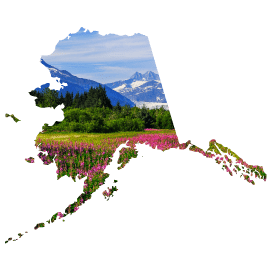Preparation for the Classroom: Alaska
Alternate Routes Policy
Analysis of Alaska's policies
Alaska does not offer any alternate routes to certification.
Recommendations for Alaska
Establish an alternate route to licensure.
Alaska should establish an alternate route to licensure that is distinct from the traditional certification process. This route should be flexible regarding the needs of nontraditional candidates in order to broaden and deepen the available pool of teachers. Such alternate route programs should also have established coursework guidelines that are manageable given the time constraints of a novice teacher and contribute to the immediate needs of new teachers. In addition, these programs should be required to provide strong induction programs and opportunities for candidates to practice teach prior to their placement in the classroom.
State response to our analysis
Alaska was helpful in providing NCTQ with facts that enhanced this analysis.
Alaska noted that a one-year Initial Proof of Program Enrollment teacher certification is offered to individuals enrolled in a traditional teacher preparation program who have already completed a bachelor's degree, passed approved Basic Competency and Content Area exams, and have at least five years of experience in the subject they will be teaching. Individuals enrolled in a Special Education teacher preparation program are not eligible for this certification. This certification is not an alternate route, but it does allow subject-matter experts to begin teaching while they pursue the traditional route. Individuals who take advantage of this route must enroll in an approved teacher preparation program and complete the program within two years.
Updated: December 2017
Select another topic
General Teacher Preparation
- Program Entry
- Teacher Shortages and Surpluses
- Program Performance Measures
- Program Reporting Requirements
- Student Teaching/Clinical Practice
- Teaching Methods
Elementary Teacher Preparation
Secondary Teacher Preparation
- Middle School Content Knowledge
- Middle School Licensure Deficiencies
- Adolescent Literacy
- Secondary Content Knowledge
- Secondary Licensure Deficiencies
Special Education Teacher Preparation
Alternate Routes
Hiring
- Requirements for Out-of-State Teachers
- Provisional and Emergency Licensure
- Licensure for Substitute Teachers
- Supporting New Teachers
Teacher and Principal Evaluation
Teacher Compensation
Retaining Effective Teachers
Early Childhood Preparation
How we graded
5B: Preparation for the Classroom
- Practice Teaching: The state should require a supervised practice-teaching experience.
- Induction: The state should require that all new teachers receive intensive induction support.
- Manageable Coursework: The state should ensure that the amount of coursework it either requires or allows is manageable for a novice teacher. Anything exceeding 12 credit hours may be counterproductive, placing too great a burden on the teacher. This calculation is premised on no more than six credit hours in the summer, three credit hours in the spring, and three credit hours in the fall.
- Targeted Coursework: The state should ensure that all coursework requirements are targeted to the immediate needs of the new teacher (e.g., seminars with other grade-level teachers, classroom management techniques, training in a particular curriculum, reading instruction).
The total goal score is earned based on the following:
- Full credit: The state will earn the full point if all four elements are required for all alternate route programs.
- Three-quarters credit: The state will earn three-quarters of a point if three elements are required for all alternate route programs.
- One-half credit: The state will earn one-half of a point if two elements are required for at least some of the state's alternate route programs.
- One-quarter credit: The state will earn one-quarter of a point if one element is required for at least one of the state's alternate route programs.
Research rationale
Alternate route programs must provide practical, meaningful preparation that is sensitive to a new teacher's workload and stress level. Too many states have policies requiring alternate route programs to "backload" large amounts of traditional education coursework, thereby preventing the emergence of real alternatives to traditional preparation. This issue is especially important given the large proportion of alternate route teachers who complete this coursework while teaching. Alternate route teachers often have to deal with the stresses of beginning to teach while also completing required coursework in the evenings and on weekends.[1] States need to be careful to require participants only to meet standards or complete coursework that is practical and immediately helpful to a new teacher.[2] That is, while advanced pedagogy coursework may be meaningful for veteran teachers, alternate route coursework should build on more fundamental teaching competencies such as classroom management techniques, reading instruction, or curriculum delivery.
Most new teachers—regardless of their preparation—find themselves overwhelmed by taking on their own classrooms. This is especially true for alternate route teachers, who may have had considerably less classroom exposure or pedagogy training than traditionally prepared teachers.[3] States must ensure that alternate route programs do not leave new teachers to "sink or swim" on their own when they begin teaching. It is critical that all alternate route programs provide at least a brief student teaching or other supervised practice experience for candidates before they enter the classroom, as well as ongoing induction support during those first critical months as a new teacher.[4]
[1] Constantine, J., Player, D., Silva, T., Hallgren, K., Grider, M., & Deke, J. (2009). An evaluation of teachers trained through different routes to certification. Final Report. NCEE 2009-4043. National Center for Education Evaluation and Regional Assistance. Retrieved from http://files.eric.ed.gov/fulltext/ED504313.pdf
[2] Walsh, K., & Jacobs, S. (2007). Alternative certification isn't alternative. Thomas B. Fordham Institute, National Council on Teacher Quality. Retrieved from http://files.eric.ed.gov/fulltext/ED498382.pdf
[3] Greenberg, J., Walsh, K., & McKee, A. (2014). Teacher Prep Review: A review of the nation's teacher preparation programs. Retrieved from http://www.nctq.org/dmsView/Teacher_Prep_Review_2014_Report
[4] For a further review of the research on new teacher induction, see: Rogers, M., Lopez, A., Lash, A., Schaffner, M., Shields, P., & Wagner, M. (2004). Review of research on the impact of beginning teacher induction on teacher quality and retention. Retrieved from http://www.newteacher.com/pdf/ResearchontheImpactofInduction.pdf

